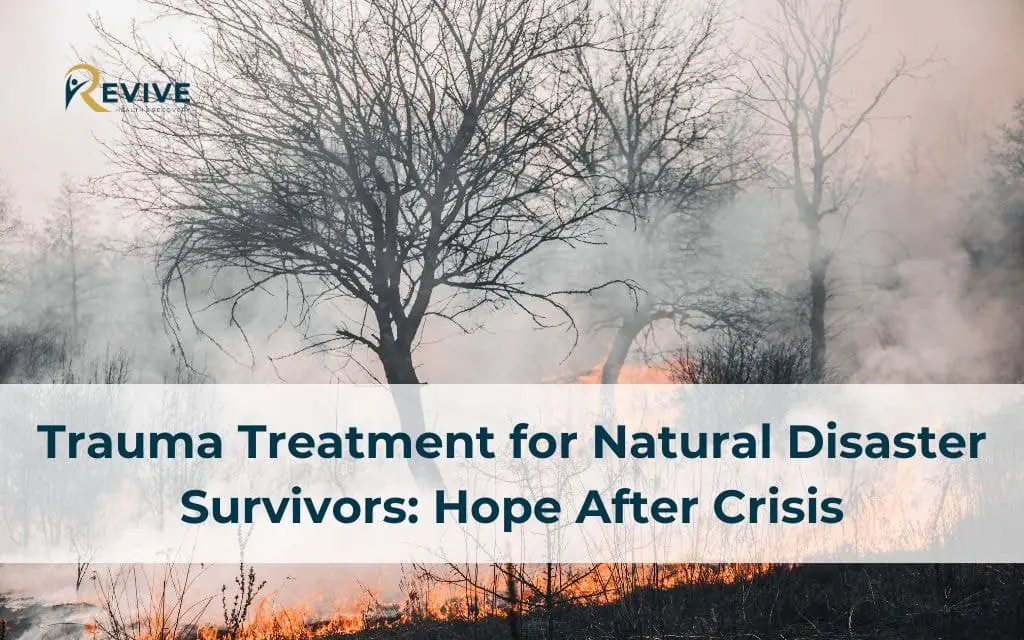The aftermath of natural disasters extends beyond physical destruction. For many survivors in Denver and throughout Colorado that need to Rebuild After Trauma, the psychological impact lingers long after homes are rebuilt and communities restored. At Revive Health Recovery, we understand that healing requires comprehensive support for both visible and invisible wounds. Our trauma treatment for natural disaster survivors provides the specialized care needed to recover.
What Trauma Looks Like After a Natural Disaster
Recognizing Trauma and PTSD
When natural disasters strike, survivors often experience psychological responses that can develop into more serious conditions. Common reactions include flashbacks of the event, heightened anxiety, sleep disturbances, emotional numbness, and avoidance behaviors. These symptoms can evolve into Post-Traumatic Stress Disorder (PTSD) when they persist beyond one month and interfere with daily functioning.
The psychological impact varies greatly among individuals. Research, including studies by Dr. Roxane Cohen Silver, demonstrates that how trauma treatment helps natural disaster survivors depends on personal vulnerability factors, the disaster’s severity, and access to support systems.
Colorado’s Disaster Landscape
Colorado residents face unique challenges from recurring natural disasters. The Marshall Fire destroyed over 1,000 homes in Boulder County in 2021. The devastating 2013 Colorado floods affected 17 counties. These events create ripple effects throughout communities, challenging community resilience after disasters.

Many survivors experience similar psychological responses despite different disaster types. Traumatic experiences from wildfires, floods, tornadoes, and other disasters share common elements, as outlined in our guide on types of trauma: sudden onset, threat to safety, loss of control, and disruption of community ties. Mayo Clinic offers a comprehensive guide to understanding trauma responses.
Why Early Help Matters
Addressing trauma early prevents more serious conditions from developing. Acute stress disorder treatment within the first month after a disaster can significantly reduce the likelihood of developing chronic PTSD.
According to disaster psychology research, timely intervention addresses immediate distress while building coping mechanisms for long-term recovery. Psychological first aid provides immediate emotional support, practical assistance, and connection to resources, creating a foundation for further trauma treatment for natural disaster survivors when needed.
How Trauma Treatment Can Help You Heal
Proven Therapies Explained
Several evidence-based treatments have demonstrated effectiveness for disaster-related trauma:
- Trauma-Focused Cognitive Behavioral Therapy (TF-CBT) helps survivors recognize and change unhelpful thought patterns related to the traumatic event.
- Eye Movement Desensitization and Reprocessing (EMDR) helps the brain process traumatic memories through bilateral stimulation, reducing their emotional impact.
- Cognitive Processing Therapy (CPT) focuses on challenging and modifying unhelpful beliefs related to the trauma.
Reviews of trauma therapies for disaster survivors consistently show these approaches can significantly reduce symptoms and improve quality of life when delivered by qualified professionals. NCTSN provides comprehensive information on validated trauma treatment approaches.
Beyond Talk Therapy
Recovery often extends beyond traditional talk therapy by Skilled Emotional Assistance. Complementary approaches, such as virtual reality therapy for trauma exposure, include:
- Trauma-sensitive yoga combines movement, breathing, and mindfulness to reconnect with the body in a safe environment.
- Group therapy offers connection with others who have shared similar experiences, reducing isolation.
- Expressive arts therapies use creative processes to explore emotions that may be difficult to verbalize.
- Mindfulness practices help ground survivors in the present moment, reducing rumination and anxiety.

Stories of Recovery
Maria survived the Marshall Fire, losing her home and most possessions. Initially experiencing severe anxiety, flashbacks, and sleep disruptions, she found Revive Health Recovery three months after the disaster. Through a combination of EMDR and group support, Maria gradually rebuilt her sense of safety and developed new coping skills. Today, she volunteers with a local disaster preparedness organization, transforming her experience into community support.
Finding Best Trauma Treatment for natural disaster survivors Denver
Why Revive Health Recovery Stands Out
Revive Health Recovery offers specialized trauma treatment for natural disaster survivors in Denver with evidence-based programs delivered by clinicians trained in disaster response. Our approach, featuring trauma-informed stabilization treatment, includes:
- Comprehensive assessment of disaster-related trauma symptoms
- Individualized treatment plans addressing specific needs
- Integration of multiple therapeutic modalities
- Coordination with community resources for holistic support
Our clinicians understand Colorado’s unique disaster landscape and tailor interventions accordingly, whether you’re dealing with wildfire trauma or flood-related anxiety.
Other Trusted Denver Resources
When you need to find a trauma therapist for natural disaster survivors in Denver, several quality options exist:
- The Center for Trauma & Resilience offers culturally responsive trauma services in multiple languages.
- Denver Health’s Outpatient Behavioral Health Services provides trauma-focused treatment through their community clinics.
- Colorado Crisis Services offers 24/7 support and connections to local providers.
- American Red Cross provides disaster mental health services and referrals.
What to Look for in a Therapist
Finding the right trauma therapist improves treatment outcomes. Consider these factors:
- Specialized training in trauma treatment, particularly disaster-related trauma
- Experience working with disaster survivors
- Knowledge of evidence-based trauma therapies
- Cultural competency that respects your background and values
- Compatibility with your communication style and needs
Ask potential therapists about their experience working with disaster survivors and their approach to trauma treatment for natural disaster survivors.
Accessing Trauma Treatment After a Disaster
Step-by-Step: Getting Started
- Assess your needs: Consider whether you’re experiencing symptoms that interfere with daily functioning.
- Reach out: Contact Revive Health Recovery at (303) 268-4655 for a confidential assessment.
- Explore resources: The Federal Emergency Management Agency (FEMA) and American Red Cross often establish recovery centers after disasters with mental health services. SAMHSA offers additional disaster behavioral health resources to help survivors cope.
- Consider telehealth: Virtual appointments offer flexibility and accessibility, especially valuable for those with transportation challenges.
- Connect with support groups: Community organizations often provide peer support specifically for disaster survivors.
How to access trauma treatment after a natural disaster often depends on timing. Immediately after a disaster, crisis counseling may be available through relief organizations. For ongoing treatment, professional mental health services offer more comprehensive care.
Understanding Costs and Support
Concerns about the cost of trauma treatment for natural disaster survivors in Denver shouldn’t prevent seeking help. Several options can make treatment accessible:
- Insurance coverage: Most health insurance plans cover mental health services; check your specific benefits.
- FEMA assistance: Following federally declared disasters, FEMA may provide crisis counseling funding.
- Victim compensation programs: Colorado’s Crime Victim Compensation program sometimes assists disaster victims.
- Sliding scale fees: Many providers, including Revive Health Recovery, adjust costs based on financial need.
- Grant-funded programs: Temporary programs often emerge after major disasters to provide free or low-cost services.

Community and Federal Resources
Beyond clinical treatment, community and federal organizations provide valuable support:
- Federal Emergency Management Agency (FEMA) offers disaster case management and mental health resources.
- American Red Cross provides immediate disaster mental health services and community referrals.
- Colorado Department of Public Health and Environment coordinates statewide behavioral health disaster response.
- Local faith communities often organize support groups and practical assistance for affected members.
- Denver Disaster Assistance Center serves as a centralized resource during major events.
Building Resilience for the Future
The Power of Connection
Social connection plays a crucial role in recovery from disaster trauma. Research consistently shows that strong social support networks improve resilience and recovery outcomes. Group-based interventions like:
- Structured support groups for disaster survivors
- Community rebuilding initiatives
- Volunteer opportunities related to disaster preparedness
- Neighborhood emergency response teams
These connections reduce isolation while fostering a sense of meaning and purpose – key elements in post-traumatic growth.
Long-Term Healing
Recovery from disaster trauma isn’t merely about symptom reduction – it’s about building a meaningful life after loss, as explored in our guide on healing from trauma. Long-term healing often includes:
- Developing stronger coping skills applicable to future challenges
- Integrating the disaster experience into your life narrative
- Finding meaning through helping others or community involvement
- Recognizing personal strength discovered through adversity
- Establishing new routines and traditions
Many survivors report post-disaster growth, finding unexpected positive changes in their perspective, relationships, and priorities.
Faqs About Trauma Treatment For Natural Disaster Survivors
What therapies work best for disaster trauma?
Evidence-based therapies like EMDR, TF-CBT, and CPT show the strongest results. Revive Health Recovery offers these proven approaches with clinicians specially trained in trauma treatment for natural disaster survivors.
How soon should I seek help after a disaster?
Seek help immediately if you’re struggling to function or feeling overwhelmed. Everyone processes trauma differently, but early intervention tends to improve outcomes and prevent chronic issues.
How much does trauma treatment cost in Denver?
Costs vary widely based on provider and insurance. Revive Health Recovery offers multiple payment options including insurance, sliding scale fees, and assistance programs for disaster survivors.
Can FEMA or insurance cover my therapy?
Yes, FEMA disaster assistance sometimes covers mental health treatment. Most insurance plans now cover mental health services, though coverage details vary. Revive Health Recovery can help you navigate these options.
How do I find the right trauma therapist in Denver?
Start by contacting Revive Health Recovery at (303) 268-4655. Our intake specialists will match you with a trauma specialist experienced in disaster recovery based on your specific needs.
Finding Your Path Forward
Recovering from disaster trauma takes time, but with appropriate support, healing is possible. Denver offers comprehensive resources for survivors, with Revive Health Recovery leading in specialized trauma treatment for natural disaster survivors.
Remember that seeking help demonstrates strength, not weakness. The impact of disasters may leave lasting memories, but with effective treatment, these memories need not control your life.
For immediate support or to learn more about treatment options, contact Revive Health Recovery today. Your journey toward healing begins with a single step – reaching out.



